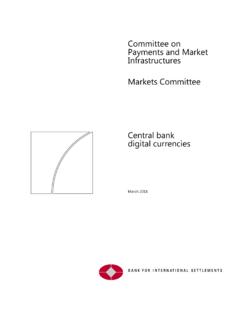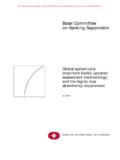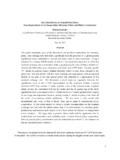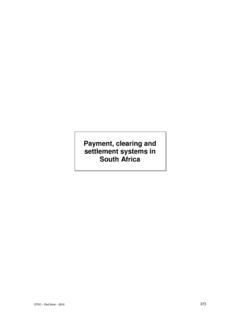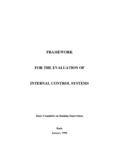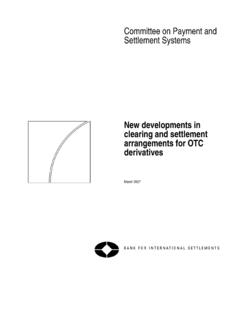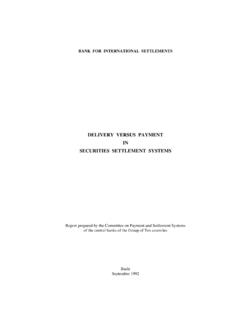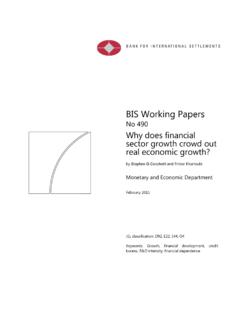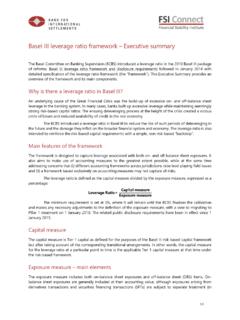Transcription of Payment systems in South Africa - Bank for International ...
1 THE Payment SYSTEMIN South AFRICAT able of ContentsOVERVIEW OF THE NATIONAL Payment SYSTEM IN South Africa .. ASPECTS .. legal aspects .. role of financial intermediaries that provide Payment services .. role of the central bank .. role of other private sector and public sector bodies .. Council of South African Bankers .. BANKSERV .. Payment Association of South Africa .. users of South Africa .. Treasury Operators Forum .. Association of Bank Card Issuers .. INFORMATION ON Payment MEDIA USED BY NON-BANKS .. payments .. payments .. Cheque payments .. Cards .. Electronic instruments .. INTERBANK EXCHANGE AND SETTLEMENT overview .. , operation and administration of large-value Major legislation, regulation and policies.
2 Participants in the system .. Types of transactions handled .. Operation of the transfer system .. Settlement procedures .. Backup solutions .. Pricing policies .. Credit and liquidity risk .. USE OF INTERBANK TRANSFER systems FOR INTERNATIONALAND DOMESTIC FINANCIAL TRANSACTIONS .. and settlement systems for International transactions .. Retail International transactions .. and settlement systems for securities transactions .. The Johannesburg Stock Exchange .. The South African Futures Exchange .. The Bond Exchange of South Africa .. ROLE OF THE CENTRAL BANK IN INTERBANK SETTLEMENTSYSTEMS .. of settlement facilities .. policy and the Payment system .. DEVELOPMENTS IN THE NATIONAL Payment SYSTEM .. establishment of National Payment System management South African Multiple Option Settlement system.
3 Cash developments .. African Development Community Payment system initiatives .. framework for the new National Payment System .. settlement in the financial markets .. and coin management project .. accommodation arrangements for monetary policy purposes .. 162 Tables .. 164 Appendices .. 167- 151 - South AfricaOVERVIEW OF THE NATIONAL Payment SYSTEM IN South AFRICAThe South African national Payment system is presently undergoing various fundamentalreforms. In November 1995 a comprehensive new national Payment system (NPS) strategy, whichwas a collaborative effort between the South African Reserve Bank and the banking industry, waspublished in the NPS Strategy and Framework document. The strategy encompasses the vision,fundamental principles and critical success factors for the reform of the domestic national paymentsystem in the Republic of South Africa .
4 The objectives of the strategy cover a broad spectrum, fromplacing the South African Payment system on a par with International standards, to developing asound and robust Payment system, serving the requirements of domestic and International businessand providing access to secure Payment mechanisms for all South the core of the new NPS lies the South African Multiple Option Settlement (SAMOS)system, implemented on 9th March 1998. This new electronic interbank funds transfer systemprovides for immediate finality and irrevocability of settlement through the real-time gross settlementoption, the so-called real-time line (RTL) (also see ). The new settlement system will also providefor a delayed net settlement option, which will, by means of collateralisation, ensure new developments are taking place as a result of the new national Payment systemreforms (see section 6).
5 This chapter will, however, focus mainly on the status of the nationalpayment system as at the end of General legal aspectsThe South African Reserve Bank Act, Act No. 90 of 1989 provides in general terms thatthe central bank may organise and participate in a clearing system. The Reserve Bank does notpresently have any specific statutory powers to supervise the national Payment Payment system, however, is in general terms regulated by commercial law while thebanking industry is subject to various laws, regulations and related legislation such as: the Banks Act, Act No. 94 of 1990; the Mutual Banks Act, Act No. 124 of 1993; the Bills of Exchange Act, Act No. 34 of 1964; the Companies Act, Act No. 61 of 1973; the Insolvency Act, Act No.
6 24 of a Payment system viewpoint the Bills of Exchange Act deals mainly with the usageof paper-based cheques and bills of exchange. No legislative framework or relevant case law for thehandling of electronic payments role of financial intermediaries that provide Payment servicesThere are mainly two categories of registered banking institutions, namely banks andmutual banks. An institution is registered as a bank or as a branch of a foreign institution under theBanks Act or as a mutual bank under the Mutual Banks Act and is therefore subject to the supervisionof the South African banking supervisory authority. A bank is also required to be registered as apublic company in terms of the Companies Act whereby equity is provided by the bank s- 152 - South Africashareholders.
7 A mutual bank is not registered in terms of the Companies Act, but certain provisions ofthe Companies Act relating to solvency and liquidation are, however, applicable to mutual Postbank was exempted from the provisions of the Banks Act by Government NoticeNo. 334, as published in Government Gazette No. 13744 dated 24th January 1992 and is also notregistered under the Companies Act. The Minister of Finance, however, retains the discretion towithdraw the exemption from the provisions of the Banks is mainly registered banking institutions that provide Payment services to the wide range of services include money transmission facilities via cheques, cash, credit and debitcards and home banking services. Banks also issue credit cards which are affiliated to either the VISAor MasterCard non-bank institutions also provide Payment services to their customers.
8 AmericanExpress and Diners Club issue travel cards in South Africa while a number of private sector retailersprovide private-label credit cards. The Post Office provides mail orders and telegram services inrespect of the transfer of role of the central bankThe main responsibility of the Reserve Bank is to formulate and implement monetarypolicy to attain its mission. The Bank s mission is to protect the value of the currency. The ReserveBank has the statutory role of issuing notes and coin and holds the loan, settlement and cash reserveaccounts of registered banks. The Reserve Bank also provides banking and Payment services to thegovernment as well as to the neighbouring countries central banks (see section 5 for a more detaileddiscussion on the role of the central bank).
9 Role of other private-sector and public-sector Council of South African BankersThe Council of South African Bankers (COSAB) is the de facto collective body,representing the interests of the banking industry in South Africa as a BANKSERVBANKSERV is the largest operator (providing infrastructural components) in the SouthAfrican Payment and clearing system. Services provided by BANKSERV include the AutomatedClearing Bureau (ACB) for the processing of magnetic ink character recognition (MICR) cheques,cheques processed through code-line clearing (CLC), an electronic funds-transfer (EFT) service, theswitching of electronic payments between banks (SASWITCH) and the clearing of South AfricanPayment System (ZAPS) and South African Netting System (ZANS) payments through (Society for Worldwide Interbank Financial Telecommunication).
10 The MICR service is an automatedcheque-clearing system, whereby the ACB electronically proves, sorts and re-lists cheques cleared byclearing banks on sophisticated computerised equipment. The CLC service is an automateddebit-clearing system for cheques. Participating banks send information of deposited chequeselectronically to the ACB, which processes the information in order to provide inward and outwardclearance figures and data for 153 - South Payment Association of South AfricaThe Payment Association of South Africa (PASA) was established in November 1996 toact as the governing umbrella body of all Payment Stream Associations (PSAs) (also see ). A PSAis an association of banks that provide Payment instruments in a specific Payment stream to theircustomers.
